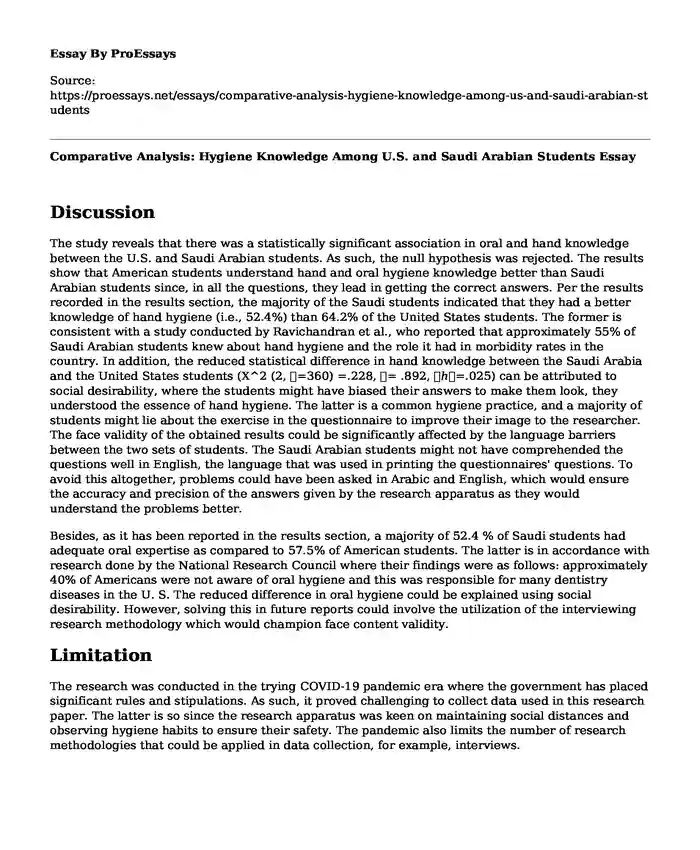Discussion
The study reveals that there was a statistically significant association in oral and hand knowledge between the U.S. and Saudi Arabian students. As such, the null hypothesis was rejected. The results show that American students understand hand and oral hygiene knowledge better than Saudi Arabian students since, in all the questions, they lead in getting the correct answers. Per the results recorded in the results section, the majority of the Saudi students indicated that they had a better knowledge of hand hygiene (i.e., 52.4%) than 64.2% of the United States students. The former is consistent with a study conducted by Ravichandran et al., who reported that approximately 55% of Saudi Arabian students knew about hand hygiene and the role it had in morbidity rates in the country. In addition, the reduced statistical difference in hand knowledge between the Saudi Arabia and the United States students (X^2 (2, =360) =.228, = .892, =.025) can be attributed to social desirability, where the students might have biased their answers to make them look, they understood the essence of hand hygiene. The latter is a common hygiene practice, and a majority of students might lie about the exercise in the questionnaire to improve their image to the researcher. The face validity of the obtained results could be significantly affected by the language barriers between the two sets of students. The Saudi Arabian students might not have comprehended the questions well in English, the language that was used in printing the questionnaires' questions. To avoid this altogether, problems could have been asked in Arabic and English, which would ensure the accuracy and precision of the answers given by the research apparatus as they would understand the problems better.
Besides, as it has been reported in the results section, a majority of 52.4 % of Saudi students had adequate oral expertise as compared to 57.5% of American students. The latter is in accordance with research done by the National Research Council where their findings were as follows: approximately 40% of Americans were not aware of oral hygiene and this was responsible for many dentistry diseases in the U. S. The reduced difference in oral hygiene could be explained using social desirability. However, solving this in future reports could involve the utilization of the interviewing research methodology which would champion face content validity.
Limitation
The research was conducted in the trying COVID-19 pandemic era where the government has placed significant rules and stipulations. As such, it proved challenging to collect data used in this research paper. The latter is so since the research apparatus was keen on maintaining social distances and observing hygiene habits to ensure their safety. The pandemic also limits the number of research methodologies that could be applied in data collection, for example, interviews.
References
Gustafsson, S., Hörder, H., Hammar, I. O., & Skoog, I. (2018). Face and content validity and acceptability of the Swedish ICECAP-O capability measure: cognitive interviews with 70-year-old persons. Health Psychology Research, 6(1). https://doi.org/10.4081/hpr.2018.6496
Hwang, E. S., & Park, J. H. (2016). The Effect of a Scenario-based Hand Hygiene Education Program on Hand Hygiene Knowledge, Hand Hygiene Perception, Hand Hygiene Compliance, and Hand Hygiene Method in Nursing Students*. Journal of Korean Academy of Fundamentals of Nursing, 23(2), 194–203. https://doi.org/10.7739/jkafn.2016.23.2.194
National Institute of Dental Research. (2015, April). 2000 Surgeon General's Report on Oral Health in America. National Institute of Dental and Craniofacial Research. https://www.nidcr.nih.gov/research/data-statistics/surgeon-general.
National Research Council. (2005). Advancing the nation's health needs: Nih Research Training Programs. National Academies Press.
Cite this page
Comparative Analysis: Hygiene Knowledge Among U.S. and Saudi Arabian Students. (2024, Jan 29). Retrieved from https://proessays.net/essays/comparative-analysis-hygiene-knowledge-among-us-and-saudi-arabian-students
If you are the original author of this essay and no longer wish to have it published on the ProEssays website, please click below to request its removal:
- Role of Communication in Organization Essay Example
- Essay Example on Confucianism: A Vital Force in Arising China's Social Structures
- Essay on My Objectivist Beliefs: How Self-Interest, Reason, Capitalism, and Reality Unify
- Essay Sample on Schools' Safety: Securing Kids' Future from Intruders & Active Shooters
- Essay Example on Interpersonal, Verbal & Written Communication: Strengthening Relationships
- Essay Example on Legalizing Marijuana: A Power Struggle Between State and Federal Institutions
- Civilization in Mesopotamia, Egypt and China - Essay Sample







